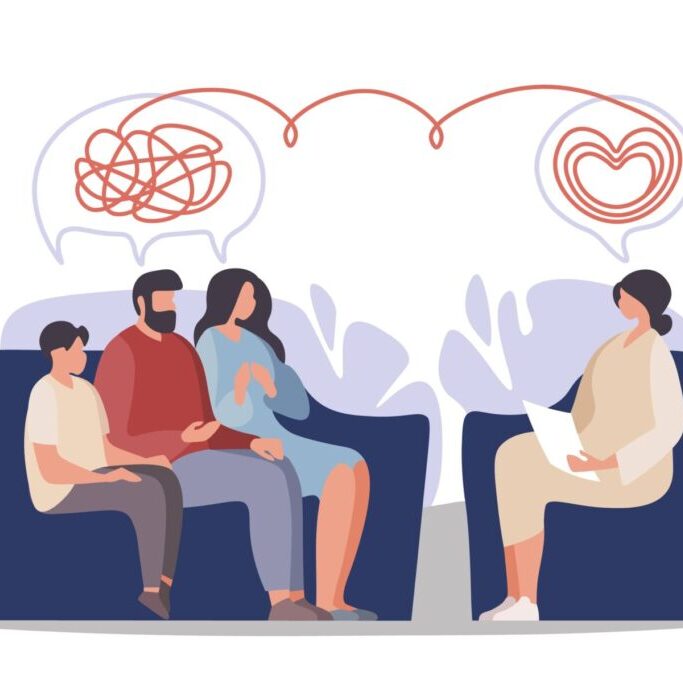What Is Queer Affirming Therapy?

The mental health world has become increasingly accepting of LGBTQIA+ people, but queer affirming therapy remains an important consideration for many people seeking therapy!
Let’s recall that The American Psychiatric Association (APA)did not officially stop considering homosexuality a mental illness until 1973, when it removed homosexuality from its Diagnostic and Statistical Manual of Mental Disorders (DSM). It is worth noting that prior to this, the APA had classified homosexuality as a mental disorder since the first edition of the DSM in 1952. More still, as of February 2023, only 21 states ban conversion therapy for minors (Movement Advancement Project https://www.lgbtmap.org/equality-maps/conversion_therapy). Yet, we understand that it’s imperative that therapists acknowledge and understand the unique experiences and challenges faced by individuals who identify as queer or LGBT.
Gay Affirmative Therapy
Initial attempts to shift toxic shame, minority stress, and stigma away from the personal responsibility of gay men onto the systems that impact them was made by Alan K. Malyon in 1982, who reportedly coined the term “gay affirming therapy.” Douglas K. Haldeman, a psychologist and professor at the University of Washington, in his 1994 book “The Practice and Ethics of Sexual Orientation Conversion Therapy” reiterated the term, which some attribute to him. In the book, Haldeman argued that mental health professionals should actively affirm and support the identities of LGBTQ+ clients, rather than attempting to change or suppress their sexual orientation or gender identity.
Queer Affirming Therapy
Since the introduction of the term “gay affirmative therapy”, the approach has evolved and expanded to include other LGBTQ+ identities and has been adopted by mental health professionals around the world. Today, the approach is also commonly referred to as LGBTQ-affirming therapy or queer-affirming therapy.
Queer affirming therapy acknowledges and affirms the diversity of gender and sexual identities, and strives to create a safe and supportive environment for clients to explore their unique experiences.
Queer-affirmative therapy is unique in that it is specifically designed to support individuals who identify as LGBTQ+ (lesbian, gay, bisexual, transgender, queer, etc.). Queer-affirming therapy is different from traditional therapy approaches in several important ways:
- Language: Queer-affirming therapy uses inclusive and affirming language that acknowledges and affirms the diverse experiences of LGBTQ+ individuals. This includes using preferred pronouns, using non-judgmental language, and avoiding assumptions about gender and sexual orientation.
- Focus on identity: Queer-affirming therapy recognizes that identity is a key component of mental health and well-being. Therapists working from a queer-affirmative perspective prioritize exploring clients’ identities, experiences, and goals related to their gender and sexual orientation.
- Understanding systemic oppression: Queer-affirmative therapy acknowledges the impact of systemic oppression and discrimination on the mental health of LGBTQ+ individuals. Therapists working from a queer-affirmative perspective strive to create a safe and supportive environment that addresses the impact of these systems and focuses on social justice issues.
- Tailored approach: Queer-affirming therapy is tailored to the unique needs and experiences of LGBTQ+ individuals. Therapists working from this approach recognize that LGBTQ+ clients may face unique challenges related to their identities and prioritize creating a treatment plan that addresses these challenges.
- Positive: Queer-affirming therapy involves a positive outlook on LGBTQ identities and relationships while also recognizing and addressing the negative impact of homophobia, transphobia, and heterosexism on the lives of LGBTQ clients.
Addressing and Understanding Heteronormativity
For many of us who grew up queer in a world that largely ignored or marginalized our relationships, it’s not uncommon to internalize the belief that our way of loving is somehow different or outside the norm. This notion is perpetuated by the heteronormativity that is ingrained in popular culture, from gendered toys to the portrayal of love in Disney movies. These cultural messages can send a powerful message to queer children, creating an early sense that there is something fundamentally flawed or unacceptable about their identities.
Toxic Shame and Mental Health
Toxic shame is a deep-seated feeling of shame and inadequacy that goes beyond healthy feelings of guilt or regret. It can play a significant role in mental health, as it can lead to a range of negative emotions and behaviors that can impact overall well-being. Individuals who experience toxic shame may feel unworthy or unlovable, leading to low self-esteem, negative self-talk, and a sense of disconnection from others. This can, in turn, contribute to symptoms of depression, anxiety, and other mental health issues.
Toxic shame can also impact relationships, as individuals who experience shame may struggle to form deep connections with others or may engage in self-sabotaging behaviors that undermine their relationships. Additionally, shame can be a significant barrier to seeking help for mental health issues, as individuals may feel that they are unworthy of support or that their struggles are not valid.
Toxic Shame and Queer Affirming Therapy
Toxic shame can be particularly prevalent among individuals who identify as LGBTQ+ due to the internalization of negative messages about their sexual orientation or gender identity. This can lead to feelings of worthlessness, low self-esteem, and self-hatred.
Queer affirming therapy affirms LGBTQ+ identities can be particularly helpful in resolving toxic shame. By creating a safe and supportive environment that validates the experiences and identities of LGBTQ+ individuals, therapists can help clients to reframe their internalized negative messages and develop a positive sense of self. This may involve exploring the origins of toxic shame, identifying negative self-talk, and developing coping strategies for managing shame triggers.
Queer-affirmative therapy may also involve addressing the impact of systemic oppression and discrimination on the lives of LGBTQ+ individuals. This can help clients to develop a broader understanding of the cultural and societal factors that contribute to their feelings of shame and inadequacy, and to develop strategies for coping with these challenges.
Overall, therapy that affirms LGBTQ+ identities can be a powerful tool for resolving toxic shame and helping individuals to develop a positive sense of self-worth and self-acceptance. Through this process, clients can begin to heal from the emotional wounds of internalized homophobia or transphobia and move towards greater self-love and self-compassion.
We’re here to help!
If you are a queer person struggling with mental health issues, it’s important to know that you are not alone. Mental health challenges are common among LGBTQ+ individuals, and seeking support can be an important step towards healing and growth. At Tandem Psychology, we offer queer-affirmative therapy with therapists who understand and affirm the unique experiences of LGBTQ+ individuals. Our therapists are available to provide support either in-person at our Lakeview neighborhood location or via telehealth, providing accessible and supportive care for clients wherever they are. Through queer-affirmative therapy, our therapists can help you develop a positive sense of self-worth and self-acceptance, heal from the emotional wounds of internalized homophobia or transphobia, and move towards greater self-love and self-compassion.
This blog is made for informational and educational purposes only. It is not medical advice.
The information in this blog is not intended to (1) replace a one-on-one relationship with a qualified licensed health care provider, (2) create or establish a provider-patient relationship, or (3) create a duty for us to follow up with you.



